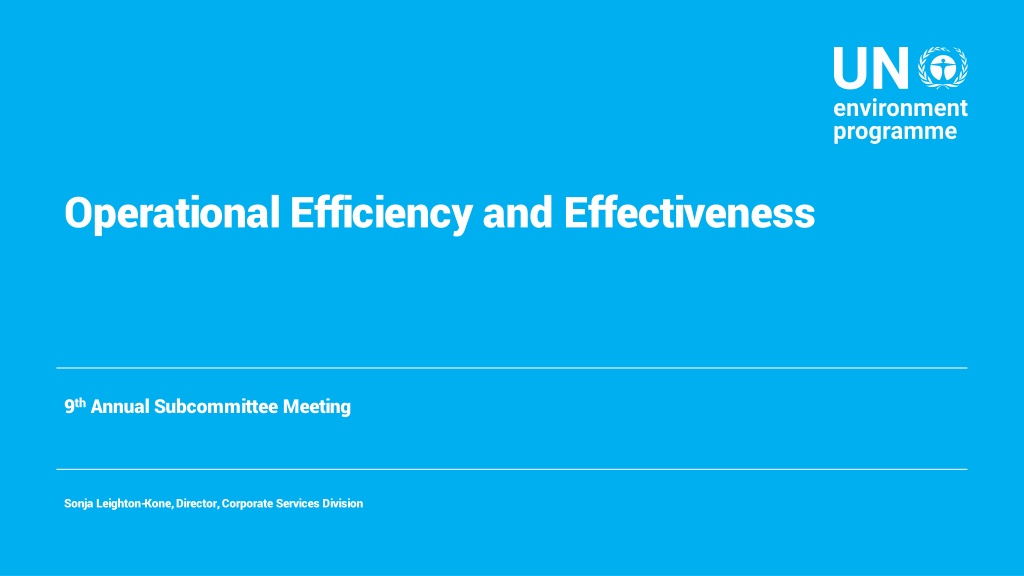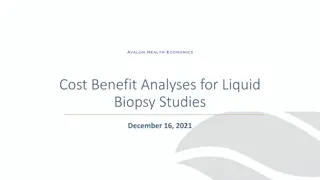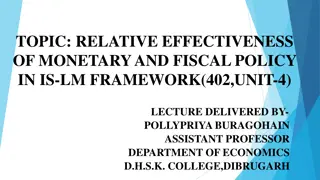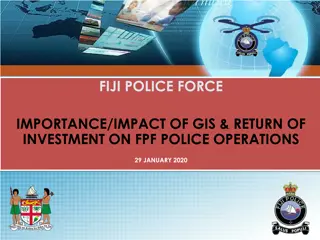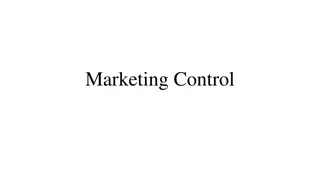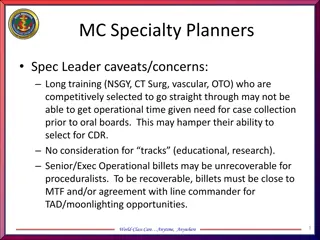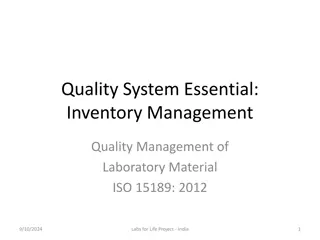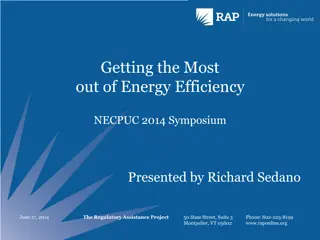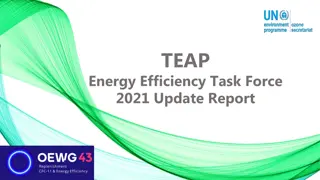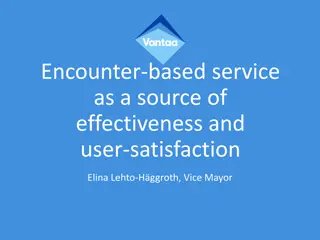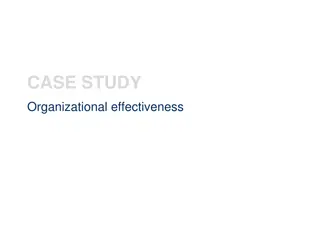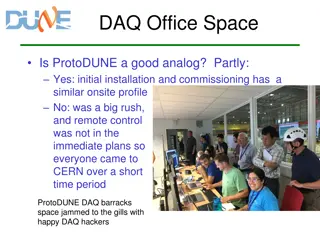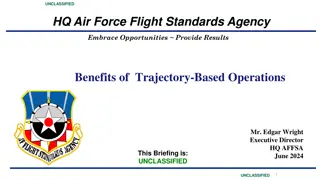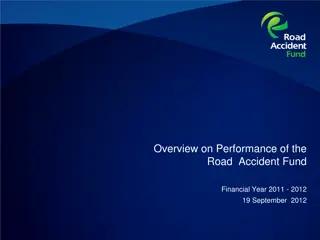Operational Efficiency and Effectiveness
Explore the operational efficiency and effectiveness discussed at the 9th Annual Subcommittee Meeting, along with insights into human resources overview focusing on staff distribution and categories as of September 2022. The report delves into general staffing statistics, regional representation, outreach efforts, and conduct and discipline policies.
Download Presentation

Please find below an Image/Link to download the presentation.
The content on the website is provided AS IS for your information and personal use only. It may not be sold, licensed, or shared on other websites without obtaining consent from the author. Download presentation by click this link. If you encounter any issues during the download, it is possible that the publisher has removed the file from their server.
E N D
Presentation Transcript
Operational Efficiency and Effectiveness 9th Annual Subcommittee Meeting Sonja Leighton-Kone, Director, Corporate Services Division
Human Resources Overview General Staffing Staff Distribution and Categories As of 30 September 2022, UNEP employed 1323 staff members comprising 1035 (78%) in the Secretariat and 288 (22%) in the MEAs. Of the 1323 staff members, 806 (61%) were in the professional and higher categories, 12 (1%) in the National Professional Officer (NPO) category and 505 (38%) in the General Service category.
Human Resources Overview General Staffing Staff Distribution and Categories Out of the total staff portfolio of 1323 in September, 62% (817) are female and 38% (506) are male. The UNEP Secretariat employed 1035 staff. 61% were female and 39% male.
Human Resources Overview Regional Representation P and Above Staff
Human Resources Outreach and Young Talent in accordance to the 4-Point Plan Key Achievements: The internal Human Resources Dashboard for senior management and hiring managers Outreach products (presentations, distribution materials) specifically on How to Apply to UNEP for outreach events and career fairs Working with/through UNEP networks: Internal UNEP sections and units who are recruiting UN-system wide: UN agencies/entities, inter-agency working groups Academic institutions with graduate programmes, research institutions and alumni networks in targeted regions and/or with large diaspora from targeted regions Developing the Young/Future Talent Pipeline for specific number of recruitments to be targeted at focus regions. Engagement Engagement (Active) Passive (Engagement) Q1 2022 1200 1100 Q2 2022 3675 3945 Q3 2022 135 432 Total engagement 5010 4487
Conduct and Discipline Policy and Approach Priorities Misconduct Risk Register- Priority areas identified Types of misconduct Sexual harassment Abuse of authority and harassment Sexual Exploitation and Abuse Unauthorized outside activities Other types of misconduct including fraud and corruption Reporting Reporting misconduct Preliminary assessments- Timeline to complete reviews of reports of possible unsatisfactory conduct and implementation of recommendations from preliminary assessments Cooperation with the Office of Internal Oversight Services (OIOS) Actions taken Managerial, administrative and disciplinary measures
Implementation of Misconduct Risk Register Capacity awareness/sensitization for UNEP Personnel Trainings- Leadership role in addressing sexual harassment Regular update of internal UNEP C&D page to sensitize UNEP Personnel Q and A Memo on Outside occupation and activities UNEP response on SH and SEA visible and whistleblower/retaliation on UNEP main website 5 United to Respect Dialogues Workshops Mandatory training on Preventing Fraud and Corruption at the United Nations - UNEP is raising awareness about fraud and corruption: UNEP s Corporate Academy includes two courses on fraud and corruption: Anti-Fraud Policy Fundamentals (CSD 104) and Navigating the Anti-Fraud and Anti- Corruption Policy (CSD 105). Sexual Harassment Actively follow up on complaints for sexual harassment with the OIOS Administrative/Managerial action taken- Reprimand letter, Administrative leave without pay, termination of staff member appointment. Broadcast to staff member on sexual exploitation and whistleblowing Sexual harassment action plan for UNEP UNEP Conduct and Discipline policy and approach Sexual Exploitation and abuse (SEA) Policy: Statement on the protection from SEA for Implementing partners Policy: Statement on protection of SEA for UNEP Personnel Active participation in UN SEA Working group Active participation in the UNON- PSEA Task force- participated in the development the PSEA Brochure for UNON Reporting on C&D Annual fraud and corruption report Annual conduct and discipline report Report to the CPR on action on Sexual Harassment (SH) and Prevention of Sexual Exploitation and Abuse (PSEA)
Audit and Investigation Recommendations External: The following internal audits have been closed as implemented since the beginning of 2021: In 2021 and 2022, the following audits were undertaken: 1. The Board of Auditors (BOA) from China conducted the Internal Control and Management Audit (Interim) on UNEP Headquarter including Regional Office for North America (NAO) and The Secretariat of the Convention on Biological Diversity (SCBD) and the end of year Financial Audit (Final) for FY2021. 1. 2015 Audit of the United Nations Environment Programme Caribbean Environment Programme 2015 Environmental Governance Subprogramme 2016 Resource Efficiency Sub-Programme 2018 Audit of Official Travel at UNEP 2018 UNEP Afghanistan Project Office 2019 Audit of the Recruitment Process at the UNEP 2021 Audit on the Multilateral Fund (MLF) 2021 Evaluation of the Prevention, Response and Victim Support Efforts Against Sexual Exploitation and Abuse by the United Secretariat Staff and Related Personal. 2. 3. 4. 5. 6. 7. 8. Internal: In 2021 and 2022, the following audits were undertaken: 1. 2021 Audit of Accounts Receivable and Accounts Payable at UNON, UNEP and UN-Habitat: Received 5 important recommendations. 2021 Audit of response to COVID 19 at UNON, UNEP and UN- Habitat: Received 2 important recommendations. 2021 Audit on the Multilateral Fund (MLF): Received 6 important recommendations All 6 implemented. 2021 Audit on the Regional Office for Africa (ROA): Received 6 important recommendations. 2021 Audit on the UNEP Secretariat of the Convention on International Trade in Endangered Species (CITES): Received 9 important recommendations. 2021 Evaluation of the Prevention, Response and Victim Support Efforts Against Sexual Exploitation and Abuse by the United Secretariat Staff and Related Personal. All 2 implemented. Audit of ICT Governance, operations and security at UNEP Not yet published. 2022 Audit of the Ecosystems Division at United Nations Environment Programme Not yet published. 2. Ongoing implementation from internal audits: (26 total open recommendation) 3. 1. 2018 Audit of the Convention for the Protection and Development of the Marine and Coastal Environment of the West and Central African Region (Abidjan Convention) (2) 2019 Audit of Secretariat of the Convention on Biological Diversity (SCBD) (3) 2019 Audit of Management of Partnerships at UNEP (6) 2019 Audit of Grants Management at UNON, UNEP and UN-HABITAT (2) 2021 Audit of Regional Office for Africa (ROA) (3) 2021 Audit of Secretariat of the Convention on International Trade in Endangered Species (CITES) (7) 2021 Audit of Accounts Receivable and Accounts Payable at UNON, UNEP and UN-Habitat (1) 2021 Audit of response to COVID 19 at UNON, UNEP and UN-Habitat (2) 4. 2. 3. 4. 5. 6. 5. 6. 7. 7. 8. 8.
Management Decisions based on Risk Information Key Achievements: Risk Committee established o Risk Treatment and Response Plan Monitoring and Assurance Meetings proceeded o Enterprise Risk Management (ERM) and Environmental Management System (EMS) Integration o Additional ERM Module 3 & 4 to Corporate Academy o Assigning of Risk Focal Points for MEA s, Divisions, Offices Away from Headquarters (staff+10) o Bottom-up Approach initiated along with Top-down Approach o Risks: o High risk categories (Implementing Partners and Procurement) require further corporate-wide leadership, discussion, strategy, and development due to their divisional transcendence and complexity Lessons Learned: Successful implementation of ERM requires establishment of essential internal organizational structures and resources with clear roles and responsibilities in line with the ERM policy and three lines of defence model. A two-year cycle for the Top-Down/ Bottom-up approaches has been established to accommodate full deployment of the ERM framework across the Organization including its Divisions, MEA s, and Offices Away From Headquarters (Staff 10+) o o
Environmental Sustainability Management Key Achievements: Assigning of Environmental Sustainability Focal Points for Offices Away from Headquarters Compilationof UNEP EnvironmentalInventoryand boundaryextension Environmental Risk registers approach initiated for Headquarters and Offices Away in line with Enterprise Risk Management (ERM) Launch of the new Greening the Blue Tutorial to be mandatory for all UNEP personnel and five new EMS Modules to Corporate Academy Update travelGuidelines to reduce environmentalfootprintfrom air travels Commencementof workwith UN Secretariatand Umoja/BI Team for Carbon Tool and its applicationto UNEP air travelGreenhouseGases (GHG) emissions o o o o o o Risks: o Available resources across Office Away from Headquarters for environmental data collection and the challenges associated with environmental sustainability management and implementation at shared facilities EMS Policy and Manual need more updates, including risks identified during the establishment of Environmental Risk register Updatesto the UN secretariat software come with their own set of risks as the solution is not tailored for UNEP and its specificies Lessons Learned: o o Successful deployment of EMS across Offices Away from Headquarters requires: Appointment of resources with clear roles and responsibilities and a knowledge sharing platform to improve capabilities and share best practices Drawn up a systematic approach to facilitate consistent deployment of the EMS across the Offices Away From Headquarters o o
Thank you Sonja Leighton-Kone Director, Corporate Services Division Sonja.leighton-kone@un.org www.unep.org United Nations Avenue, Gigiri PO Box 30552 00100 GPO Nairobi, Kenya
